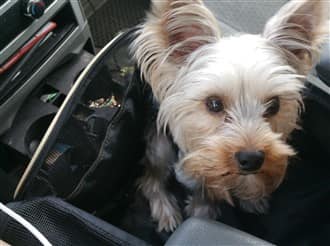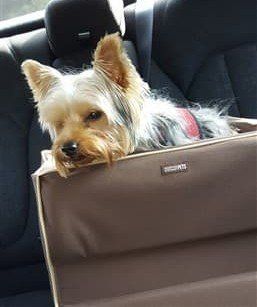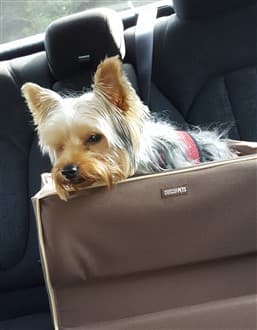Yorkshire Terrier Car Sickness
Clinical signs:
- Nausea
- Vomiting
- Whining
- Drooling
- Restless or panicked behavior
Onset:
May begin at any time during the car ride. Some Yorkies start to feel sick almost immediately; others have a certain 'breaking point'; this may vary depending on how long they are driven and the driving conditions (lots of breaking and acceleration, or frequent turns can cause a dog to feel sick faster or with more severity).
What Causes a Yorkie to Feel Car Sick
Dogs develop motion sickness due to conflicting signals.
The inner ears sense movement, as does the body due to force felt during acceleration, turns, stops, and starts.
But, the inside of the car is not
moving.
When the balance-sensing system is thrown off this way, it can be very discombobulating, causing nausea. The nausea, in turn, causes the other symptoms including drooling, restless behavior, and whining.
Owners may make the mistake of holding their Yorkie on their lap to 'help'; but, this often exacerbates things, not to mention that is a flat-out dangerous.
Other steps may be taken such as offering more fresh air; however, as long as the car is still moving, it's hard to resolve motion sickness once it has begun. For this reason, your best course of action is to prevent it in the first place.
The 5 Steps to Prevent a Yorkie From Getting Car Sick
#1 Have the right car seat.

Andy, at 2 years, 3 months, photo courtesy of Fanya
1 -
If you choose a properly raised booster seat, this will keep your Yorkie elevated, offering better line-of-sight out of the car windows. This greatly helps with the disconnect of feeling motion but not seeing motion.
2-
The supportive sides of the seat offer structure and the harness-to-seat buckle keeps a Yorkie in place. This stabilizes the body, helping to prevent 'corrections' that a dog must make when a car brakes, accelerates, and turns.
Tips:
- You'll want the car seat to be designed for toy breeds. This will offer the right sizing in regard to both height and depth.
- If you have two Yorkies, you may want to consider a double-seats.
- The inside of the seat will have a short buckle. This is the harness connector; it is meant to be snapped to the o-ring of a dog's harness, and not a collar. Connecting this to a collar can result in severe neck injury.
- If you do not yet have a harness for your Yorkie, not only is this needed in the car, but it is also highly recommended any time that a Yorkie in on leash. It is an important step in helping to prevent collapsed trachea, a serious condition that commonly affects toy breeds.
Below are some of our top recommended car seats that will help with motion sickness, as well as safe harnesses that can be found small enough to fit this toy breed.
If you do not see the images, try a refresh. And on mobile, you may need to turn your screen horizontal to see all 4.
#2 Time meals and offer certain snacks.
Dogs do better if they have not had a full meal right before being driven in the car. So, you'll want at least two hours to go by between a meal and a car ride.
This said, an entirely empty stomach is not a great idea either. Without something in the tummy, all there will be is stomach acid, which can rise up and cause a dog to feel ill. It's best to have a little something to act as a cushion. In addition, certain ingredients can help prevent queasiness.
There are 3 types of snacks that can help:
1-
A small dry snack
given 15 minutes before being placed in the car. You'll want to choose something that is easily digestible, and 100% all-natural, since snacks with preservatives, coloring, or cheap ingredients can cause upset stomach all on their own.
Below are some of our top recommendations for treats that can help a Yorkie with motion sickness. If you do not see the images, try a refresh. And on mobile, you may need to turn your screen horizontal to see all 4.
A note about our suggestions:
For dry treats
to cushion the stomach, our choice is Old Mother Hubbard treats which are sized nicely, are 100% all natural, and are made in the USA. And Fruitables is another of our favorites; the crunchy options include pumpkin & banana and pumpkin & blueberry.
For herbal/spice treats, a really good one that has a blend of pumpkin and ginger is Dynamo Tummy Treats. These are grain-free, 100% all natural, and are made in the USA.
And for a super helpful blend of cinnamon, ginger, and clove, the 4Legz Organic treats are fantastic. These are made with organic, human-grade ingredients, and are made in the USA.
#3 Adjust air temperature and flow.
Both the temperature of the air inside of the car and how much of an air current there is should be addressed.
Temperature:
You'll want to set the correct air temperature inside the car well before you place your Yorkie in his seat. So, this typically means starting the car a good twenty minutes before leaving and seeing how things are before
you bring your Yorkie out.
In the winter, be sure to not overdo it with the heat. Most dogs do best when the air is slightly cool. So, if you crank up the heater to melt the ice and snow off of the windows, do be sure to adjust this down and let the temperature even out before it's time to go.
Air flow:
While it is not the best choice for economical gas usage, most dogs do best with a combination of temperature controlled air and fresh air via a window. So, whether the heat or AC is on, use this in conjunction with a window(s) strategically rolled down enough to offer fresh air without being overpowering.

Brownie & Pixie,
photo courtesy of Ramón (from Hawaii)
#4 Take carefully timed breaks.
If your Yorkshire Terrier doesn't do well in the car, chances are that you want to get from Point A to Point B as quickly as you can. However, this may backfire.
It typically happens like this... A Yorkie may start to feel a bit queasy, but the methods you are using are helping quite a bit, and there's no obvious signs of feeling terribly bad. So, since your puppy or dog seems okay, you keep pressing on.
But, for all dogs there is a line in the sand. It's better to take a break before a Yorkie is pushed past the point of what he can handle, than to wait until after motion sickness has developed. This is a lot easier to cure than it is to stop once its started.

For this reason, no matter how well your Yorkie is doing, if you're planning to travel
longer than 30 minutes, take a break at the halfway mark.
Find a safe spot to let your Yorkie out on leash, let him gain his bearings, have a bit of exercise to stretch his legs, go to the bathroom, and have a drink of water, and possibly another dry or herbal treat.
#5 Reverse your Yorkie's perception of the car.
When canines have a bad experience, and particularly when dogs keep having negative events happen time and time again, they learn to fear the element that is involved.
After all, why would dogs look forward to something that causes physical and/or emotional discomfort?
So, most Yorkshire Terriers that are prone to car sickness will also show signs car phobia. Whether they put up a fuss when you're trying to put them in, or cry, bark, or whine once the door is closed, your dog may make it very clear that the car is the last place they want to be.
To resolve this, you'll want your Yorkie to have pleasant experiences.
What About Prescribed Medicine?
If your Yorkie suffers from motion sickness very badly and despite taking all of the steps here to help combat it... and
if you find that you have to drive your dog quite often or will be going for a very long trip in the car, you may want to speak to your veterinarian about Dramamine (Dimenhydrinate).
This is generally given as a 'last resort'. For small dogs like the Yorkshire Terrier, typical dosing is 2 mg for each pound of body weight, given 30 minutes before car travel. The effects of this medicine can last anywhere from 3 to 6 hours.
It should not be given to dogs with certain health issues including but not limited to high blood pressure, seizure disorders, hyperthyroidism, and heart disease.
Common side effects include dry mouth, sedation, and urine retention. Possible but unlikely side effects include diarrhea and/or vomiting.
Do you keep your Yorkie safe in a car seat?
You May Also Like:
Top recommended shampoos and coat products for Yorkies
- A look at which products can be beneficial to your Yorkie's skin and coat.
The benefits of a playpen
- See how the right playpen can be a tremendous help with everything from housebreaking to chewing and even how well your Yorkie copes when home alone.
Carry options for a Yorkie
- Heading somewhere that'll be risky to let your Yorkie follow you on ground level? Or want to bring your dog to an event that will have too much walking? See some great methods to bring your Yorkie along.




